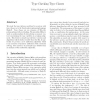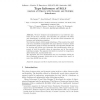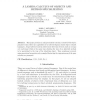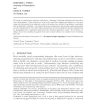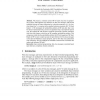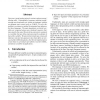FOCS
1992
IEEE
15 years 6 months ago
1992
IEEE
Partial types for the -calculus were introduced by Thatte in 1988 [3] as a means of typing objects that are not typable with simple types, such as heterogeneous lists and persiste...
129
click to vote
POPL
1993
ACM
15 years 6 months ago
1993
ACM
We study the type inference problem for a system with type classes as in the functional programminglanguage Haskell. Type classes are an extension of ML-style polymorphismwith ove...
135
Voted
AISC
1992
Springer
15 years 6 months ago
1992
Springer
Abstract. An important feature of modern computer algebra systems is the support of a rich type system with the possibility of type inference. Basic features of such a type system ...
129
click to vote
ECOOP
1993
Springer
15 years 6 months ago
1993
Springer
Abstract. We have designed and implemented a type inference algorithm for the Self language. The algorithm can guarantee the safety and disambiguity of message sends, and provide u...
109
Voted
LICS
1994
IEEE
15 years 6 months ago
1994
IEEE
Abadi and Cardelli have recently investigated a calculus of objects [2]. The calculus supports a key feature of object-oriented languages: an object can be emulated by another obj...
129
click to vote
LICS
1993
IEEE
15 years 6 months ago
1993
IEEE
This paper presents an untyped lambda calculus, extended with object primitives that reflect the capabilities of so-called delegation-based object-oriented languages. A type infer...
141
click to vote
POPL
1997
ACM
15 years 6 months ago
1997
ACM
Languages like ML and Haskell encourage the view of values as first-class entities that can be passed as arguments or results of functions, or stored as components of data struct...
146
Voted
POPL
1998
ACM
15 years 6 months ago
1998
ACM
constraint solver. The other infers annotations on bound variables in function abstractions by propagating type constraints downward from enclosing application nodes. We motivate o...
124
click to vote
ASIAN
1998
Springer
15 years 6 months ago
1998
Springer
Abstract. We present a constraint system OF of feature trees that is appropriate to specify and implement type inference for first-class messages. OF extends traditional systems of...
111
click to vote
WCRE
1998
IEEE
15 years 6 months ago
1998
IEEE
Types are a good starting point for various software reengineering tasks. Unfortunately, programs requiring reengineering most desperately are written in languages without an adeq...

